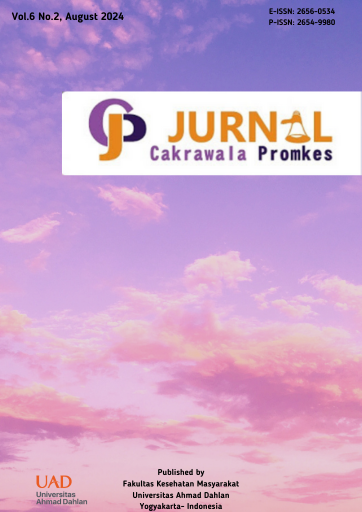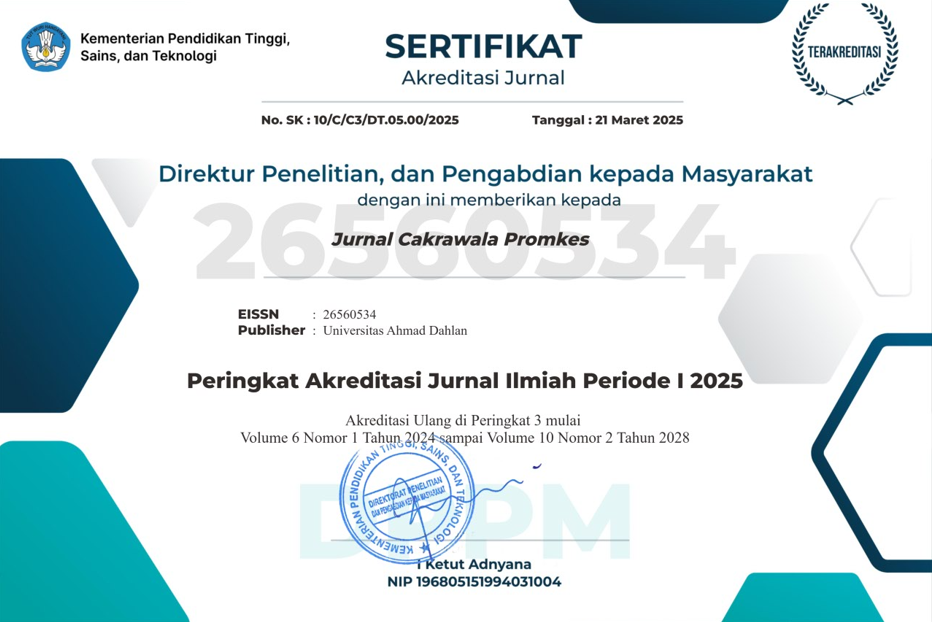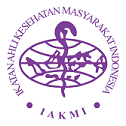The relationship between parental feeding styles and the nutritional status of toddlers among working mothers in Yogyakarta
DOI:
https://doi.org/10.12928/jcp.v6i2.11116Keywords:
Nutritional Status, Parental Feeding , Toddlers, Working MothersAbstract
The increasing number of mothers working outside the home represents a significant social and economic change. The rise in women's workforce participation has notably impacted family dynamics, particularly influencing working mothers' feeding styles on child development and nutritional status. This study aims to determine the relationship between parental feeding style and toddler’s nutritional status among working mothers. This is an observational analytic study with a cross-sectional design. The target population includes all working mothers with toddlers in the Yogyakarta Special Region. Samples were purposively selected, comprising 211 mother-toddler pairs. Data were collected through self-administered online and offline questionnaires on respondent characteristics and feeding styles using the Caregiver Feeding Style Questionnaire. Toddler nutritional status data were measured using weight-for-age (W/A), height-for-age (H/A), and weight-for-height (W/H) indices, obtained through direct measurements of weight and height. The Spearman rank correlation test was used to evaluate the relationship between feeding style and children's nutritional status. There was a significant negative correlation between the responsive aspect of parenting feeding style and the nutritional status on the H/A index, rₛ(210) =-0.17, p=.014. However, no significant correlations were found between the demanding aspect of feeding style and the nutritional status on the W/A, H/A, and W/H indices (rₛ(210)=-0.03, p=.662; rₛ(210)=-0.07, p=.322; rₛ(210)=-0.08, p=.226, respectively). Similarly, the responsive aspect of parenting style was not significantly correlated with the nutritional status on the W/A and W/H indices (rₛ(210)=0.01, p=.947; rₛ(210)=-0.11, p=.115, respectively). In conclusion, a relationship was found between responsive parenting feeding style and nutritional status on the H/A index. However, no significant relationships were observed between demanding feeding style and nutritional status on the W/A, H/A, and W/H indices, or between responsive style and the W/A and W/H indices. Public health interventions should focus on promoting responsive feeding styles among working mothers to improve child nutritional outcomes.
References
Bumi C. Pengaruh Ibu yang Bekerja terhadap Status Gizi UNIVERSITAS NEGERI SEMARANG. 2015;
Prasetyo YB, Permatasari P, Susanti HD. The effect of mothers' nutritional education and knowledge on children's nutritional status: a systematic review. Int J Child Care Educ Policy. 2023;17.
https://doi.org/10.1186/s40723-023-00114-7
Lin Z, Zhou Z, Zhu L, Wu W. Parenting styles, empathy and aggressive behavior in preschool children: an examination of mediating mechanisms. Front Psychol. 2023;14:1-8.
https://doi.org/10.3389/fpsyg.2023.1243623
Nadhila LF, Gita Ningrum A, Tri Arif Sampurna M. Effect of Parenting Style on Nutritional Status of Toddlers in Surabaya. Indones Midwifery Heal Sci J. 2023;7:267-75.
https://doi.org/10.20473/imhsj.v7i3.2023.267-275
Alahmadi RA. The effects of parenting style and feeding style on child weight status : A systematic review. Masters Theses. 2019;4427.
Wardiyah A, Malahayati U. The Impact Of Working Mother On Quality Time With Children. J Kesehat Panca Bakti. 2023;68-75.
Abekah-Nkrumah G, Antwi MY, Nkrumah J, Gbagbo FY. Examining working mothers' experience of exclusive breastfeeding in Ghana. Int Breastfeed J. 2020;15:1-10.
https://doi.org/10.1186/s13006-020-00300-0
S A. UNICEF : Nutrition Critical in First 1,000 Days of Child's Life [Internet]. This Day Live. 2023. hal. 1-5. Diambil dari: https://www.thisdaylive.com/index.php/2023/07/12/unicef-nutrition-critical-in-first-1000-days-of-childs-life/
Kinshella MLW, Moore SE, Elango R. The missing focus on women's health in the First 1,000 days approach to nutrition. Public Health Nutr. 2021;24:1526-30.
https://doi.org/10.1017/S1368980020003894
Tarsidi D. The Role of Parents in the Development of the Social Competence of Children with Visual Impairment. Int J Disabil Soc Incl. 2021;01:9-26.
RI K. PERMENKES RI Tentang Standar Antropometri Anak Tahun 2020. 2020.
Gorostiaga A, Aliri J, Balluerka N, Lameirinhas J. Parenting styles and internalizing symptoms in adolescence: a systematic literature review. Int J Environ Res Public Health. 2019;16.
https://doi.org/10.3390/ijerph16173192
Song JE, Roh EH, Chae HJ, Kim T. Ecological factors influencing parenting self-efficacy among working mothers with a child under 36 month old in South Korea: a cross‐sectional and correlational study. BMC Womens Health. 2022;22:1-10.
https://doi.org/10.1186/s12905-022-01639-8
Fanzo J, McLaren R, Bellows A, Carducci B. Challenges and opportunities for increasing the effectiveness of food reformulation and fortification to improve dietary and nutrition outcomes. Food Policy. 2023;119:102515.
https://doi.org/10.1016/j.foodpol.2023.102515
Lukman TNE, Anwar F, Riyadi H, Harjomidjojo H, Martianto D. Responsive Prediction Model of Stunting in Toddlers in Indonesia. Curr Res Nutr Food Sci. 2022;10:302-10.
https://doi.org/10.12944/CRNFSJ.10.1.25
Picbougoum TB, Somda MAS, Zango SH, Lohmann J, De Allegri M, Saidou H, et al. Nutritional status of children under five years and associated factors in 24 districts of Burkina Faso. PLOS Glob Public Heal. 2023;3:1-14.
https://doi.org/10.1371/journal.pgph.0001248
Nabilah NK, Rahfiludin MZ, Kartini A. Faktor-Faktor yang Mempengaruhi Status Gizi pada Anak Usia Prasekolah (Studi di Kelompok Belajar D-BAITO Sunan Plumbon dan Raudhatul Athfal MASYITHOH Krajan Kecamatan Tembarak Kabupaten Temanggung pada Tahun 2021). Media Kesehat Masy Indones. 2022;21:196-202.
https://doi.org/10.14710/mkmi.21.3.196-202
Scherer E, Hagaman A, Chung E, Rahman A, O'Donnell K, Maselko J. The relationship between responsive caregiving and child outcomes: Evidence from direct observations of mother-child dyads in Pakistan. BMC Public Health. 2019;19:1-10.
https://doi.org/10.1186/s12889-019-6571-1
Leuba AL, Meyer AH, Kakebeeke TH, Stülb K, Arhab A, Zysset AE, et al. The relationship of parenting style and eating behavior in preschool children. BMC Psychol. 2022;10:1-10.
https://doi.org/10.1186/s40359-022-00981-8
Von Salmuth V, Brennan E, Kerac M, McGrath M, Frison S, Lelijveld N. Maternal-focused interventions to improve infant growth and nutritional status in lowmiddle income countries: A systematic review of reviews. PLoS One. 2021;16:1-30.
https://doi.org/10.1371/journal.pone.0256188
Fadare O, Amare M, Mavrotas G, Akerele D, Ogunniyi A. Mother's nutrition-related knowledge and child nutrition outcomes: Empirical evidence from Nigeria. PLoS One. 2019;14:1-17.
Downloads
Published
Issue
Section
License
Copyright (c) 2024 Rizka Amelia, Ceria Ciptanurani, Silvi Lailaltul Mahfida

This work is licensed under a Creative Commons Attribution-ShareAlike 4.0 International License.
Authors who publish with JCP: Jurnal Cakrawala Promkes agree to the following terms:
- Authors retain copyright and grant the journal the right of first publication with the work simultaneously licensed under a Creative Commons Attribution License (CC BY-SA 4.0) that allows others to share the work with an acknowledgement of the work's authorship and initial publication in this journal.
- Authors are able to enter into separate, additional contractual arrangements for the non-exclusive distribution of the journal's published version of the work (e.g., post it to an institutional repository or publish it in a book), with an acknowledgement of its initial publication in this journal.
- Authors are permitted and encouraged to post their work online (e.g., in institutional repositories or on their website) prior to and during the submission process, as it can lead to productive exchanges, as well as earlier and greater citation of published work.

This work is licensed under a Creative Commons Attribution-ShareAlike 4.0 International License












